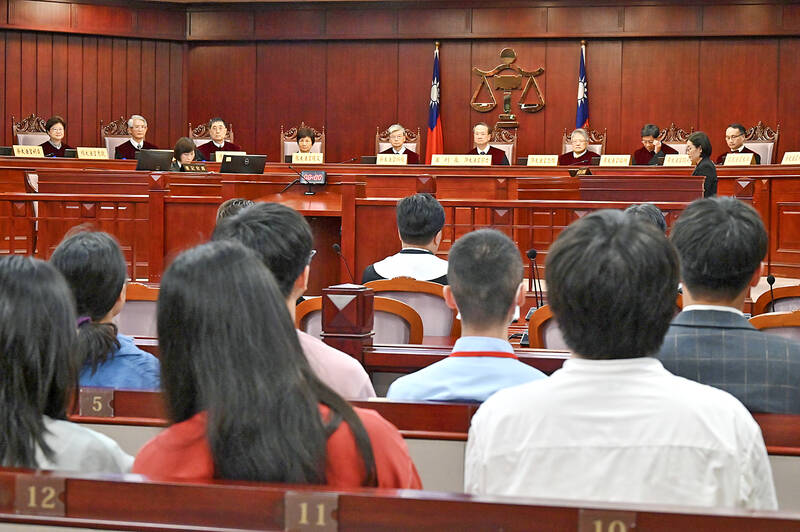Measures adopted by the legislature to raise the thresholds for Constitutional Court rulings are to take effect tomorrow after being promulgated by President William Lai (賴清德), while the Democratic Progressive Party (DPP) caucus said it has applied for a temporary injunction and a constitutional interpretation of the changes.
Presidential Office spokesperson Karen Kuo (郭雅慧) in a statement said that Lai had signed the amendments to the Constitutional Court Procedure Act (憲法訴訟法) into law.
The amendments are to take effect tomorrow, three days after promulgation.

Photo: George Tsorng, Taipei Times
Kuo cited the president as saying the measures risked disrupting Constitutional Court operations, usurping the judicial authorities’ powers and undermining the principle of separation of powers between government branches.
Lai is calling for a ruling on the constitutionality of the amendments, the spokesperson added.
Asked whether the Executive Yuan would seek a constitutional interpretation, spokesperson Michelle Lee (李慧芝) said it is deliberating the matter with Minister Without Portfolio Lin Min-hsin (林明昕).
DPP caucus whip Ker Chien-ming (柯建銘) told a news conference yesterday that a request for the court to grant a temporary injunction and review the law had been filed.
A spokesman for the court later confirmed that it had received the request.
The DPP took the action shortly after lawmakers from the Chinese Nationalist Party (KMT) and the Taiwan People’s Party (TPP), who together have a majority in the legislature, upheld the measures they had previously pushed through in a revote requested by the Cabinet.
However, with the new measures requiring a minimum of 10 justices to hear and rule on a case, it remains unclear whether the Constitutional Court, which normally has 15 justices, but currently has only eight, can review such a case.
Lai had nominated seven candidates to replace those whose eight-year terms ended on Oct. 31 last year, but all were rejected by the legislature.
The president has yet to select new nominees.
According to another new measure, a ruling declaring an existing legal provision unconstitutional must be backed by at least nine justices.
The amendments replaced previous rules that only mandated the presence of at least two-thirds of all sitting justices, with a ruling determined by a simple majority vote.
The amendments have been criticized by the DPP and civic groups as an attempt by the opposition to immobilize the court, which primarily handles petitions from the public, but also intervenes in disputes among top government bodies.
KMT and TPP lawmakers have defended the revisions, saying they would ensure more rigorous reviews by the court and that a minimum attendance requirement would prevent future cases from being decided by only a handful of justices.
The KMT yesterday said that Lai’s promulgation of the law and application for a constitutional interpretation was the worst example of going against public opinion.
Abiding by the law is the basic duty of the government, the KMT said, adding that the DPP should not act like a “crybaby” and should understand the way things work in a minority government.
Additional reporting by Chen Yun

AGING: As of last month, people aged 65 or older accounted for 20.06 percent of the total population and the number of couples who got married fell by 18,685 from 2024 Taiwan has surpassed South Korea as the country least willing to have children, with an annual crude birthrate of 4.62 per 1,000 people, Ministry of the Interior data showed yesterday. The nation was previously ranked the second-lowest country in terms of total fertility rate, or the average number of children a woman has in her lifetime. However, South Korea’s fertility rate began to recover from 2023, with total fertility rate rising from 0.72 and estimated to reach 0.82 to 0.85 by last year, and the crude birthrate projected at 6.7 per 1,000 people. Japan’s crude birthrate was projected to fall below six,

Conflict with Taiwan could leave China with “massive economic disruption, catastrophic military losses, significant social unrest, and devastating sanctions,” a US think tank said in a report released on Monday. The German Marshall Fund released a report titled If China Attacks Taiwan: The Consequences for China of “Minor Conflict” and “Major War” Scenarios. The report details the “massive” economic, military, social and international costs to China in the event of a minor conflict or major war with Taiwan, estimating that the Chinese People’s Liberation Army (PLA) could sustain losses of more than half of its active-duty ground forces, including 100,000 troops. Understanding Chinese

SELF-DEFENSE: Tokyo has accelerated its spending goal and its defense minister said the nation needs to discuss whether it should develop nuclear-powered submarines China is ramping up objections to what it sees as Japan’s desire to acquire nuclear weapons, despite Tokyo’s longstanding renunciation of such arms, deepening another fissure in the two neighbors’ increasingly tense ties. In what appears to be a concerted effort, China’s foreign and defense ministries issued statements on Thursday condemning alleged remilitarism efforts by Tokyo. The remarks came as two of the country’s top think tanks jointly issued a 29-page report framing actions by “right-wing forces” in Japan as posing a “serious threat” to world peace. While that report did not define “right-wing forces,” the Chinese Ministry of Foreign Affairs was

US President Donald Trump in an interview with the New York Times published on Thursday said that “it’s up to” Chinese President Xi Jinping (習近平) what China does on Taiwan, but that he would be “very unhappy” with a change in the “status quo.” “He [Xi] considers it to be a part of China, and that’s up to him what he’s going to be doing, but I’ve expressed to him that I would be very unhappy if he did that, and I don’t think he’ll do that. I hope he doesn’t do that,” Trump said. Trump made the comments in the context